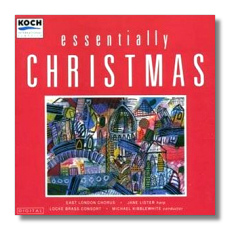
The Internet's Premier Classical Music Source
Related Links
- Latest Reviews
- More Reviews
-
By Composer
-
Collections
DVD & Blu-ray
Books
Concert Reviews
Articles/Interviews
Software
Audio
Search Amazon
Recommended Links
Site News
 CD Review
CD Review
Essentially Christmas

- Arthur Bliss: Royal Fanfares I & II
- John Owen Edwards: Wassail!
- William Walton: Coronation Te Deum (arr. Christopher Palmer)
- Bryan Kelly: Abingdon Carols
- John Rutter: Te Deum
- Ralph Vaughan Williams:
- The blessed son of God
- O clap your hands
- Richard Arnell: Ceremonial and Flourish
- Percy Grainger:
- Angelus ad virginem
- Puellare Gremium
- The matchless maiden
- Edward Gregson: Make a joyful noise
Alison Doyle, soprano
Stephen Liley, tenor
Jane Lister, harp
Paul Ayres, organ
East London Chorus
Locke Brass Consort/Michael Kibblewhite
Koch 3-7202-2 70:01
Summary for the Busy Executive: Just the thing for resting merry gentlemen.
A lovely Christmas album, hard to fault. It's not all carols, and the non-carol stuff snaps with the invigoration of crisp December air. In general, the carol arrangements succeed least. The ideal carol arrangement to me is simple and straightforward, without the taint of the too-clever, the simple-minded, or the "nice." It's awfully hard to do well.
For me, the program makes the disc. The music comes mainly from the Britten-Walton wings of 20th-century British music. Arthur Bliss, whose music I'd like to know more of, is represented by two spectacular ceremonial fanfares, which he wrote as Master of the Queen's Musick for the wedding of Princess Margaret. The inimitable Vaughan Williams has two items: the chorale "The blessed son of God" from his Fifties Christmas cantata Hodie and the open-air anthem "O clap your hands," from around 1920, in the composer's original, non-orchestral version. It makes a great noise. One can say the same for Walton's electrifying Te Deum, here in Christopher Palmer's arrangement for church-manageable forces.
I must admit the charm of Rutter's works eludes me. The small stuff I hear as brainlessly pretty. The larger works strike me as bland knock-offs of Walton's sacred music. Better to program more Walton, especially his late masterpiece, the Gloria, so much more interesting than Rutter's very popular setting. Rutter's Te Deum, coming so soon after the Walton, may have been the one miscalculation of the program. On the other hand, Rutter certainly has his fans. It may very well be that I don't hear what makes him an individual artist.
Richard Arnell I know best by his ballet scores, most notably The Great Detective, fondly remembered by fans of the British Lyrita label. He seems to be one of those composers like Rawsthorne or Stevens, lost in the shuffle during discussions of British music. The Ceremonial and Flourish is an occasional work. Written for a 1946 visit of Churchill to New York's Columbia University, it's a shame that it's been lost for so long. This is its first recording. It starts like a giant roused from sleep by nervous, quick fanfares. This leads to a fast section which begins very similar in feeling to the "two-trumpet" variation in Britten's Young Person's Guide. There's well-developed rhythmic muscle to it and a memorable "big theme."
Percy Grainger is represented by settings of medieval English music. He wrote these in the Forties, when medieval music was even more of a recherché taste than it is now. Given Grainger's independence of mind (even eccentricity), finding him there among the first is hardly surprising. His arrangements fascinate – wild, barbaric, absolutely unscholarly – and yet he has absorbed and extended the musical essence of the originals. There probably haven't been so many Landini cadences in a work since Landini.
Edward Gregson has a nice reputation as a writer for brass. The Hallé Brass Ensemble, among others, has commissioned him. His psalm setting "Make a joyful noise" aims for popularity without pandering. It's quite up to Walton's Te Deum, but with its own more sumptuous sound. It seems to have become a Christmas hit in Britain and deserves all its success.
I've not heard music by Edwards or Kelly before. Edwards seems like another Rutter, certainly no better. Kelly provides settings of little-known medieval poems (as well as poems by William Blake and by the Rev. W. Lloyd), all a cappella and all of a near-Britten level of interest. I'd love to hear more.
I'd never heard of the East London Chorus and am pleased to report they're a decent group. The sound is an "English" sound, strongly influenced by the voices of boy trebles, though it sounds to me more like women singing with a straight tone. Intonation and blend are quite fine, if not spectacular. I like them better than King's College these days, but I do prefer a meatier, more adult choral timbre. Nevertheless, they step up to the plate to hold their own against the magnificent Locke Brass Consort, and they can sustain the quiet of Vaughan Williams' "Blessed son of God" without pooping out or dissolving into weak-sister tonal wisps.
The Locke Brass Consort has, of course, been one of Britain's top brass groups for at least forty years and boasts such players as James Watson, Crispian Steele-Perkins, Colin Sheen, and Frank Lloyd. They need no puff from me. It's enough to say that with them, percussion, and organ, you don't really miss an orchestra. The performances are as big as I could want.
The CD was recorded in the Hall of University College School, London – superb sonics, decay times of at least four seconds. It reminds you of a great cathedral space.
Copyright © 2002, Steve Schwartz


















